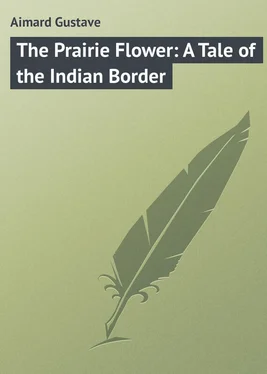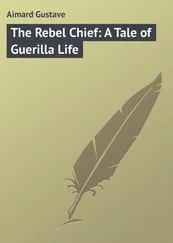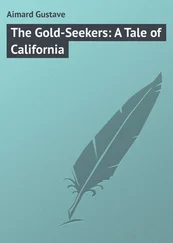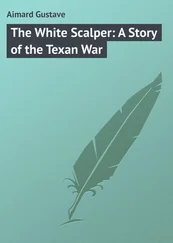Gustave Aimard - The Prairie Flower - A Tale of the Indian Border
Здесь есть возможность читать онлайн «Gustave Aimard - The Prairie Flower - A Tale of the Indian Border» — ознакомительный отрывок электронной книги совершенно бесплатно, а после прочтения отрывка купить полную версию. В некоторых случаях можно слушать аудио, скачать через торрент в формате fb2 и присутствует краткое содержание. Жанр: foreign_prose, на английском языке. Описание произведения, (предисловие) а так же отзывы посетителей доступны на портале библиотеки ЛибКат.
- Название:The Prairie Flower: A Tale of the Indian Border
- Автор:
- Жанр:
- Год:неизвестен
- ISBN:нет данных
- Рейтинг книги:4 / 5. Голосов: 1
-
Избранное:Добавить в избранное
- Отзывы:
-
Ваша оценка:
- 80
- 1
- 2
- 3
- 4
- 5
The Prairie Flower: A Tale of the Indian Border: краткое содержание, описание и аннотация
Предлагаем к чтению аннотацию, описание, краткое содержание или предисловие (зависит от того, что написал сам автор книги «The Prairie Flower: A Tale of the Indian Border»). Если вы не нашли необходимую информацию о книге — напишите в комментариях, мы постараемся отыскать её.
The Prairie Flower: A Tale of the Indian Border — читать онлайн ознакомительный отрывок
Ниже представлен текст книги, разбитый по страницам. Система сохранения места последней прочитанной страницы, позволяет с удобством читать онлайн бесплатно книгу «The Prairie Flower: A Tale of the Indian Border», без необходимости каждый раз заново искать на чём Вы остановились. Поставьте закладку, и сможете в любой момент перейти на страницу, на которой закончили чтение.
Интервал:
Закладка:
Diana, his sister, formed a complete contrast with him. She was a little creature, scarce sixteen years of age, with eyes of a deep blue like the sky, apparently frail and delicate, with a dreamy brow and laughing mouth, which belonged both to woman and angel; and whose strange beauty seduced at the first glance and subjugated at the first word that fell from her rosy lips. Diana was the idol of the family – the cherished idol, that everyone adored, and who, by a word or a glance, could command the obedience of the rude natures that surrounded her, and who only seemed to live that they might satisfy her slightest caprices.
Sam and James, the two labourers, were worthy Kentucky rustics, of extraordinary strength, and who concealed a great amount of cunning beneath their simple and even slightly silly aspect. These two young fellows, one of whom was twenty-six, the other hardly thirty, had grown up in John Black's house, and had vowed to him an unbounded devotion, of which they had furnished proofs several times since the journey began.
When John left his house to go in search of a more fertile country, he proposed to these two men to leave him, not wishing to expose them to the dangers of the precarious life which was about to begin for himself; but both shook their heads negatively, replying to all that was said to them, that it was their duty to follow their master, no matter whither he went, and they were ready to accompany him to the end of the world. The emigrant had been obliged to yield to a determination so clearly expressed, and replied, that as matters were so, they might follow him. Hence these two honest labourers were not regarded as servants, but as friends, and treated in accordance. In truth, there is nothing like a common danger to draw people together; and during the last four months John Black's family had been exposed to dangers innumerable.
The emigrant took with him a rather large number of beasts, which caused the caravan, despite all the precautions taken, to leave such a wide trail, as rendered an Indian attack possible at any moment. Still, up to the present moment, when we pay them a visit, no serious danger had really menaced them. At times they were exposed to rather smart alarms; but the Indians had always kept at a respectable distance, and limited themselves to demonstrations, hostile it is true, but never followed by any results.
During the first week of their march, the emigrants, but little versed in the mode of life of the Redskins, who incessantly prowled round the party, had been afflicted with the most exaggerated fears, expecting every moment to be attacked by those ferocious enemies, about whom they had heard stories which might make the bravest tremble; but, as so frequently happens, they had grown used to this perpetual threat of the Indians, and, while taking the strictest precautions for their safety, they had learned almost to deride the dangers which they had so much feared at the outset, and felt convinced that their calm and resolute attitude had produced an effect on the Redskins, and that the latter would not venture to come into collision with them.
Still, on this day a vague restlessness had seized on the party: they had a sort of secret foreboding that a great danger menaced them. The Indians, who, as we have said, usually accompanied them out of reach of gunshot, had all at once become invisible. Since their start from their last camping ground, they had not seen a single one, though they instinctively suspected that, if the Indians were invisible, they were not the less present, and possibly in larger numbers than before. Thus the day passed, sorrowfully and silently for the emigrants: they marched side by side, eye and ear on the watch, with their fingers on the trigger, not daring to impart their mutual fears, but (to use a Spanish expression) having their beards on their shoulders, like men expecting to be attacked at any moment. Still, the day passed without the slightest incident occurring to corroborate their apprehensions.
At sunset, the caravan was at the foot of one of those numerous mounds to which we have already alluded, and so large a number of which border the banks of the river at this spot. John Black made a sign to his son, who drove the cart, to stop, get down, and join him: while the two females looked around them restlessly, the four men, assembled a few paces in the rear, were engaged in a whispered conversation.
"Boys," Mr. Black said to his attentive companions, "the day is ended, the sun is descending behind the mountains over there, it is time to think about the night's rest. Our beasts are fatigued; we ourselves need to collect our strength for tomorrow's labour; I think, though open to correction, that we should do well to profit by the short time left us to establish our camp."
"Yes," James answered, "we have in front of us a hillock, on the top of which it would be easy for us to take up our quarters."
"And which," William interrupted him, "we could convert into an almost impregnable fortress in a few hours."
"We should have a hard job in getting the wagon up the hill," the father said, shaking his head.
"Nonsense," Sam objected, "not so much as you suppose, Master Black; a little trouble, and we can manage it."
"How so?"
"Why," the servant replied, "we need only unload the wagon."
"That's true; when it's empty, it will be easy to get it to the top of the hill."
"Stay," William observed, "do you think, father, that it is really necessary to take all that trouble? A night is soon spent, and I fancy we should do well to remain where we are: the position is an excellent one; it is only a few paces to the river bank, and we can lead our oxen to water."
"No; we must not remain here, the place is too open, and we should have no shelter if the Indians attacked us."
"The Indians!" the young man said, with a laugh; "why, we have not seen a single one the whole day."
"Yes; what you say, William, is correct, the Redskins have disappeared; but shall I tell you my real thoughts? It is really this disappearance, which I do not understand, that troubles me."
"Why so, father?"
"Because, if they are hiding, they are preparing some ambuscade, and do not wish us to know the direction where they are."
"Come, father, do you really believe that?" the young man remarked in a light tone.
"I am convinced of it," the emigrant said earnestly. The two servants bowed their heads in affirmation.
"You will pardon me, father, if I do not share your opinion," the young man continued. "For my own part, on the other hand, I feel certain that these red devils, who have been following us so long, have eventually understood that they could gain nothing from us but bullets, and, like prudent men, have given up following us further."
"No, no; you are mistaken, my son, it is not so."
"Look ye, father," the young man continued, with a certain amount of excitement, "allow me to make an observation which, I think, will bring you over to my way of thinking."
"Do so, my son; we are here to exchange our opinions freely, and select the best: the common interest is at stake, and we have to act for the safety of all: under circumstances so grave as the present, I should never forgive myself for neglecting good advice, no matter from whom it came; speak, therefore, without timidity."
"You know, father," the young man went on, "that the Indians understand honour differently from ourselves; that is to say, when the success of an expedition is not clearly proved to them, they have no shame about resigning it, because what they seek in the first place is profit."
"I know all that, my son; but I do not see yet what you are driving at."
"You will soon understand me. For nearly two months, from sunrise, the moment we set out, to sunset, which is generally the time of our halt, the Redskins have been following us step by step, and we have been unable to escape for a single moment these most troublesome neighbours, who have watched our every movement."
Читать дальшеИнтервал:
Закладка:
Похожие книги на «The Prairie Flower: A Tale of the Indian Border»
Представляем Вашему вниманию похожие книги на «The Prairie Flower: A Tale of the Indian Border» списком для выбора. Мы отобрали схожую по названию и смыслу литературу в надежде предоставить читателям больше вариантов отыскать новые, интересные, ещё непрочитанные произведения.
Обсуждение, отзывы о книге «The Prairie Flower: A Tale of the Indian Border» и просто собственные мнения читателей. Оставьте ваши комментарии, напишите, что Вы думаете о произведении, его смысле или главных героях. Укажите что конкретно понравилось, а что нет, и почему Вы так считаете.












